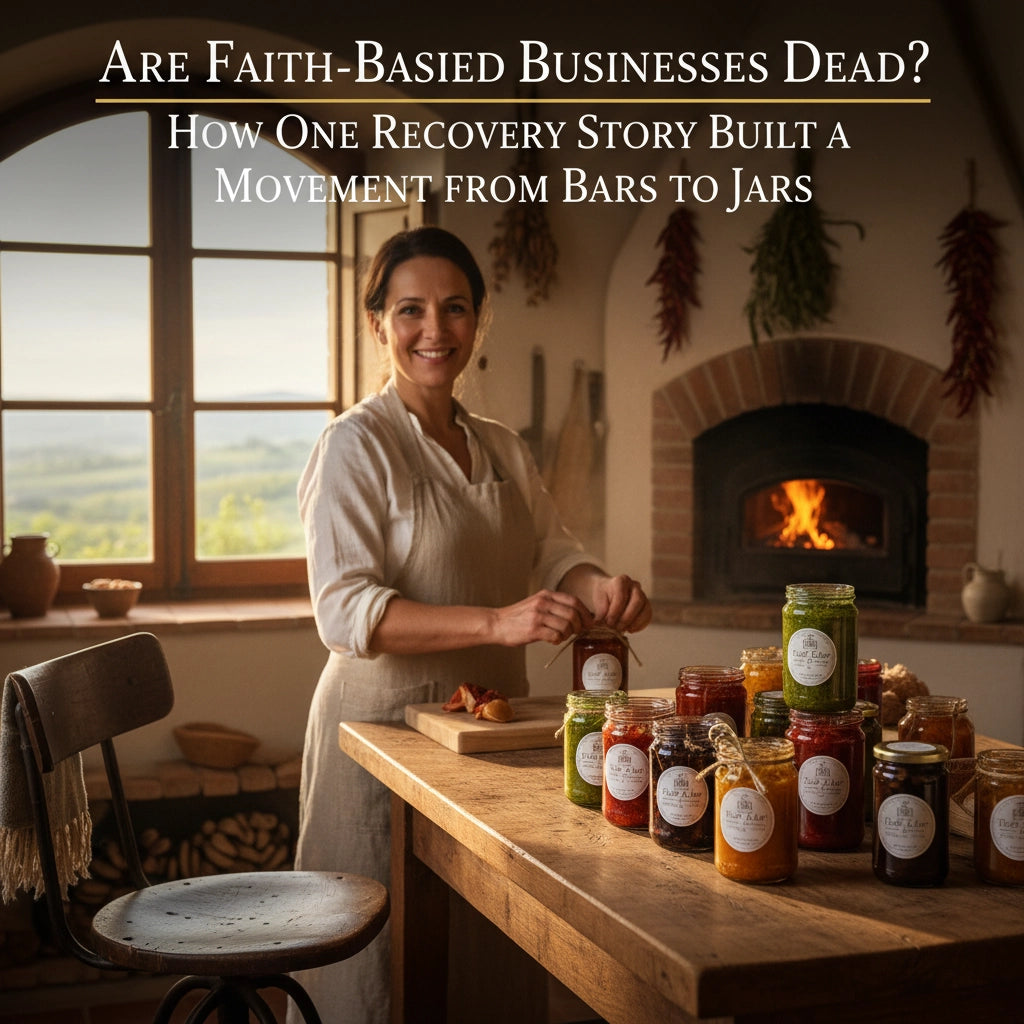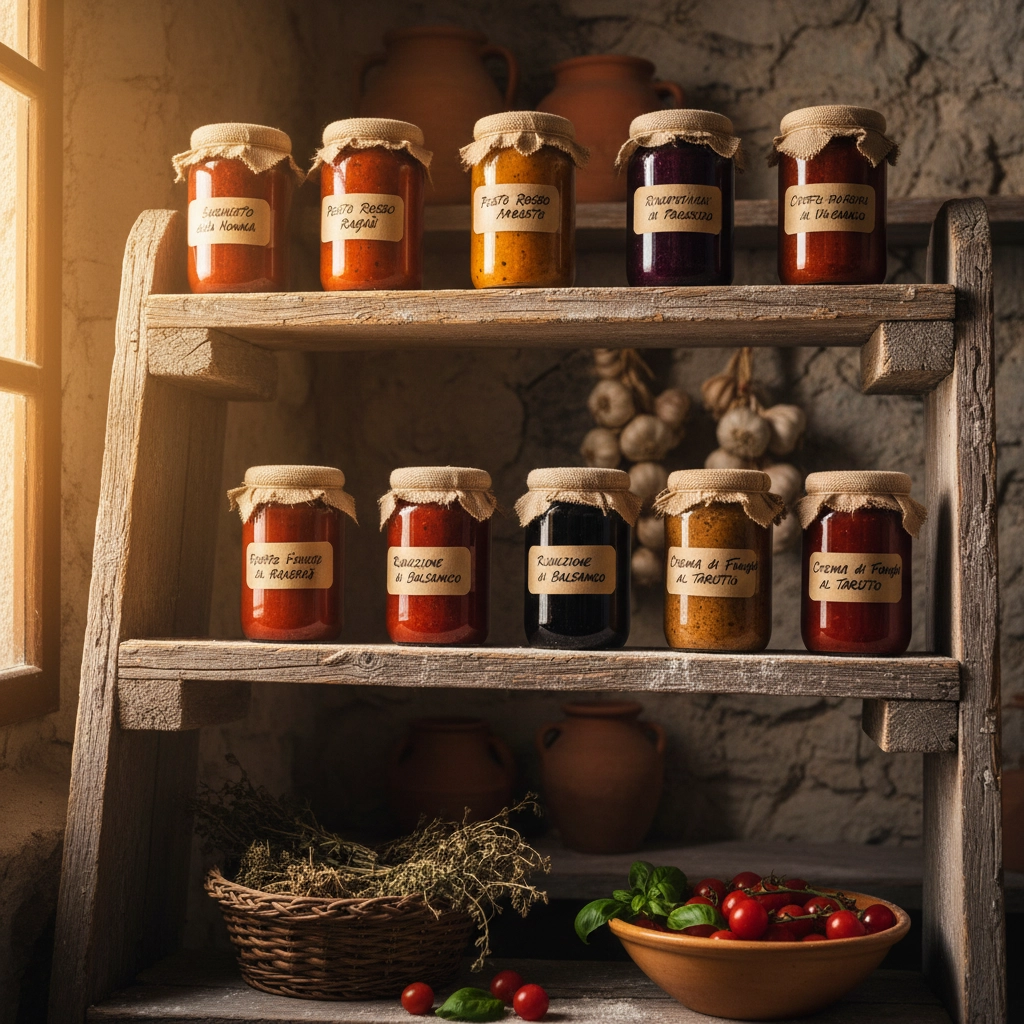
Are Faith-Based Businesses Dead? How One Recovery Story Built a Movement from Bars to Jars
Share
Let's get something straight right off the bat: faith-based businesses aren't just alive, they're absolutely crushing it. We're talking about a $1.2 trillion industry that's been quietly building an empire while everyone else was busy writing obituaries for faith in the marketplace.
The numbers don't lie. With over 190,000 religious organizations and somewhere between 356,000 to 370,000 congregations contributing to economic activity across America, faith-driven businesses represent one of the most resilient sectors in our economy. Some estimates put the total number of faith-based businesses in the U.S. at over 1.2 million. Dead? Hardly.
But here's where it gets really interesting: and personal.
When Rock Bottom Becomes Your Foundation

Joe Gallagher Jr. wasn't supposed to make it. By every metric that matters: addiction, arrests, near-death experiences: he was headed nowhere fast. A rock musician whose life had become a cautionary tale, Joe found himself staring at the kind of rock bottom that either breaks you or becomes the foundation for something extraordinary.
Spoiler alert: it became his foundation.
What happened next reads like something out of a movie script: because it literally might become one. In less than a year, Joe transformed his personal redemption into Apastioli, a multi-dimensional business that's rewriting the rules about what faith-based entrepreneurship can look like in the 21st century.
But this isn't just another feel-good comeback story. This is about how one man's decision to bet on faith over fear sparked a movement that's touching lives from small-batch, clean-label copacking kitchens in South Carolina to luxury fragrance labs, from specialty food production to recovery programs for veterans and domestic violence survivors.
From Bars to Jars: More Than Just a Catchy Title
The title of Joe's memoir, "From Bars to Jars," isn't just clever wordplay: it's a blueprint for transformation. The "bars" represent the literal and metaphorical prisons that held him captive: addiction, destructive relationships, a life spinning out of control. The "jars" represent something beautiful being created from scratch, something that nourishes others, something that builds rather than destroys.
While a 1,716-acre farm remains an aspirational vision for future expansion—not something Apastioli owns or operates today—the business has become a living testament to what's possible when faith meets action. Current production is copacked in South Carolina with ongoing hands-on, small-batch, clean-label practices. This isn't just about making artisan sauces or crafting luxury fragrances: though they're doing both exceptionally well. It's about creating jobs for people in recovery, supporting veterans finding their footing, and building a community where broken can become beautiful.

Hollywood Comes Calling
The story has sparked encouraging early conversations with industry folks, including people connected to Angel Studios' community and independent producers who have worked with major streamers. To be clear: there are no contracts with Angel Studios, Netflix, or any other major platform at this time—these are preliminary, exploratory chats—and we're discerning what a truthful, values-aligned project might look like. Any future filming locations would be selected when the time is right; the 1,716-acre farm is a long-term vision, not a current setting.
But here's what makes this different from your typical Hollywood treatment: this isn't about sanitizing the struggle or glossing over the hard parts. Joe's story—and by extension, Apastioli's mission—is built on radical honesty about failure, forgiveness, and the messy, beautiful process of rebuilding a life from the ground up.
The Faith-Based Business Renaissance

What Joe discovered, and what smart entrepreneurs across the country are figuring out, is that consumers are hungry for businesses that stand for something beyond profit margins. They want authenticity, purpose, and connection to values that matter.
The Christian retail sector alone demonstrates this appetite for faith-aligned commerce. Despite economic uncertainties, Christian retailers maintained steady sales in 2024, building on a remarkable 9% recovery in 2023. Analysis of nearly 200 U.S. Christian retailers showed $92.6 million in sales across 2.23 million consumer receipts, with 48% of stores maintaining flat or increased sales.
These businesses are concentrated most heavily in Bible Belt states: Mississippi, Alabama, Texas, Arkansas, Tennessee, Louisiana, and Oklahoma: as well as major metro areas like Atlanta, Dallas, and Houston. But the movement is spreading far beyond traditional strongholds.
Faith in Action, Not Just Words
What sets Apastioli apart from businesses that merely slap a Christian fish symbol on their marketing isn't the religious imagery: it's the integration of faith principles into every aspect of operations. Employment practices that prioritize second chances. Community engagement that goes beyond check-writing to actual relationship-building. Product development that asks not just "will this sell?" but "will this serve?"
Take their approach to manufacturing. While many food companies chase the cheapest ingredients and fastest production times, Apastioli has built their reputation on all-natural products that reflect a commitment to stewardship: of the land, of relationships with suppliers, of customers' trust.
The same philosophy carries over into their luxury fragrance work. Crafting luxury fragrances by hand isn't just about creating beautiful scents: it's about honoring the craft, respecting the process, and delivering something that reflects the care that went into its creation.

Building Movements, Not Just Businesses
The "movement" part of this story isn't hyperbole. When you create a business model that intentionally hires people in recovery, that partners with organizations supporting domestic violence survivors, that provides pathways for veterans transitioning to civilian life: you're not just running a company. You're modeling a different way of doing business that others can replicate and adapt.
And they are. Faith-based businesses are popping up across industries, from tech startups founded on kingdom principles to service companies that prioritize employee wellbeing over maximum extraction. They're proving that you don't have to choose between profitability and purpose: in fact, the combination of both often creates stronger, more sustainable businesses.
The Ripple Effect
What started as one man's desperate attempt to rebuild his life has created ripples that extend far beyond small-batch kitchens and studio benches. Every person hired who might not have gotten a chance elsewhere. Every partnership with organizations serving vulnerable populations. Every product that tells a story of redemption rather than just consumption.
The business world is taking notice in grounded, early ways. Interest and conversations are happening, but to be transparent, there are no signed deals yet—just momentum, prayer, and steady work. When customers rally around products not only for their quality but for what they represent, that's when you know something significant is taking root.

Redefining Success
Joe Gallagher's definition of success isn't measured solely in revenue streams or market share: though Apastioli is performing well on those metrics too. Success is measured in lives changed, communities strengthened, and proof that faith-based business principles can compete and thrive in any marketplace. On the financing front, fundraising is active and strong, with pitches to values-aligned private equity and high-wealth partners underway—but nothing is written in stone yet.
The Story Box they offer isn't just a product bundle: it's an invitation into a narrative that customers want to be part of. People aren't just buying sauce; they're buying into a story of redemption and hope. They're not just purchasing faith-inspired apparel; they're making a statement about values that matter to them.
This is the future of faith-based business: not hiding faith under a bushel, but not beating people over the head with it either. Instead, it's about living out faith principles so authentically and effectively that the results speak for themselves.
The Verdict
Are faith-based businesses dead? The $1.2 trillion industry says otherwise. Joe Gallagher's transformation from rock bottom to successful entrepreneur says otherwise. The growing movement of businesses that prioritize purpose alongside profit says otherwise.
What we're witnessing isn't the death of faith-based business: it's the evolution of it. From corner stores with Christian fish symbols to sophisticated operations that integrate faith principles into every aspect of their business model, these companies are proving that you can honor God, serve customers, and build sustainable enterprises all at the same time.
The movement from bars to jars isn't just Joe's story: it's a template for anyone ready to build something beautiful from whatever broken pieces they're starting with. And in a world that's hungry for authenticity, purpose, and hope, that's exactly the kind of business model that thrives. Apastioli is still a work in progress—honestly and transparently—and welcomes readers and future partners who want to help this redemptive vision become real.
